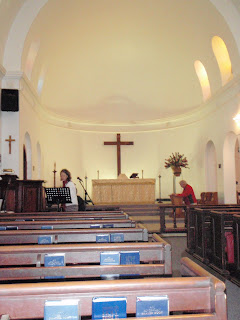
by Bob Longino
It’s not often that I’ve sung in Zulu in church. Frankly, never until now. Since arriving in South Africa just a couple of short weeks ago for a four-month work stint for Habitat for Humanity International, I’ve sung in church in Zulu and Afrikaans, recited from the Lord’s Prayer in the King’s English and already have found myself, especially when speaking in unison with the Pretoria congregation, altering the American hard “a” pronunciation of words like “death” and “breath” to sound a lot more like “beneath.”
The Zulu words “bayete ‘nkosi” translate, in effect, to “exalted king.” And the English lyrics sung later in the song include “You are crowned king of Africa / You are crowned Lord of all / You are crowned king of Africa / Who can deny you are crowned Lord of all.”
Pretty simple, straightforward, orderly stuff. But just about everything about St. Wilfrid’s Anglican Church, part of the liberal Anglican Church of Southern Africa and the church I have visited twice since arriving in Pretoria, is simple, straightforward and orderly.
Like at St. Dunstan’s in Atlanta, there’s not much muss and certainly very little fuss.
St. Wilfrid’s, built in 1925, is a tall, but small church, tucked among apartment and office buildings in an area swallowed by the University of Pretoria campus. The sanctuary is far from ornate. There’s only about a half dozen of small, stained glass windows and the altar is situated under a high dome comprised of rising walls of stark white that offset the brown tones of the altar, the credence table and a large mounted cross.
While there are many similarities between St. Dunstan’s and St. Wilfrid’s, there are marked differences. Two of the most notable involve the rectors’ approaches to their sermons and the treatment of the two churches’ main Sunday service.
At St. Dunstan’s, our rector Patricia Templeton, a superb, insightful writer, often employs in her sermons literary references, observations from historians and her own acute sense of her life experiences in evaluating both modern events and ancient scripture.
Rector Raynord Schovell at St. Wilfrid’s, speaks pointedly about the simple messages of heaven as he stands and speaks without a lectern at the front of the nave and without the benefit of written text. His sermons have stressed questions parishioners should be asking themselves – “How much do you love God?” – or have challenged his congregation to recognize that Ascension need not only be paid homage with attendance in church on its celebrated day, but accepted as a sure promise that “God’s plan will come to pass.”
St. Wilfrid’s early 7:30 a.m. service (at least the one I attended) is very traditional with standard Anglican hymns and organ music and complete dedication to the Prayer Book (roughly 30 people attended).
The Family Service, held at 9:30 a.m., is almost completely different (upwards of 90 people attended). Traditional ritual is followed, but it is peppered with modern African church music (On this Sunday we were accompanied by guitar, African drums and electric piano. Sing-along lyrics are projected by computer on the white dome walls above the altar).
Let me underscore the word family. The decidedly mixed-race congregation includes a strong mixture of the elderly, middle-aged, youth and wee ones. The church certainly benefits from its location inside a sprawling college campus. But to attract youth, St. Wilfrid’s seems to have purposefully dedicated its main service music (there is no choir) to elicit a youthful feel (think if James Millikan and his music crew grew their hair out more and were given carte blanche each Sunday).
But the most striking difference between the two churches – at least to me – so far is that after two visits I still must be an enigma. I have been greeted warmly upon arrival, people seem to be genuine in offering me the peace of the Lord and I still think fondly of the elderly man who after service one Sunday shook my hand for the third time that day and said, “Welcome and have a great Sunday.”
It’s not like this church doesn’t need parishioners. Last Sunday during announcements Rev. Schovell informed the congregation that last year’s budget deficit has meant that church staff has been warned that some might discover soon that their positions have become “redundant.”
Still, no one at St. Wilfrid’s has asked me anything about myself, like why am I here? Or where do I come from? Though the rector each Sunday has told me he hopes I’ve gotten something out of the service, he has yet to ask me my name. Or offered up his.
In a way, I guess it is a reflection of Schovell’s sermons.
It’s not up to him. It’s up to me.




No comments:
Post a Comment